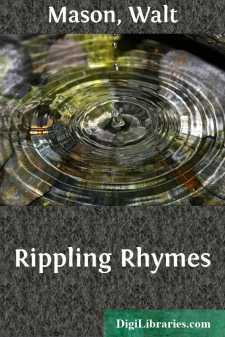Poetry Books
Sort by:
by:
Thomas Burke
Buying and Selling Throughout the day I sit behind the counter of my shop And the odours of my country are all about me— Areca nut, and betel leaf, and manioc, Lychee and suey sen, Li-un and dried seaweed, Tchah and sam-shu; And these carry my mind to half-forgotten days When tales were plentiful and care was hard to hold. All day I sell for trifling sums the wares of my...
more...
by:
Elizabeth Atkins
PREFACE Utterances of poets regarding their character and mission have perhaps received less attention than they deserve. The tacit assumption of the majority of critics seems to be that the poet, like the criminal, is the last man who should pass judgment upon his own case. Yet it is by no means certain that this view is correct. Introspective analysis on the part of the poet might reasonably be...
more...
by:
Lyman Abbott
AN INTERPRETER OF LIFE. Poetry, music, and painting are three correlated arts, connected not merely by an accidental classification, but by their intrinsic nature. For they all possess the same essential function, namely, to interpret the uninterpretable, to reveal the undiscoverable, to express the inexpressible. They all attempt, in different forms and through different languages, to translate the...
more...
CROWS.THEY stream across the fading western skyA sable cloud, far o'er the lonely leas;Now parting into scattered companies,Now closing up the broken ranks, still highAnd higher yet they mount, while, carelessly,Trail slow behind, athwart the moving treesA lingering few, 'round whom the evening breezePlays with sad whispered murmurs as they fly.A lonely figure, ghostly in the dimAnd darkening...
more...
The Cross of Pearls. ethsemane, how oft, grown dim,With bleeding hearts, unpardoned sin,A Cross with pearls, and gems inlaid,God's gift of love, the price prepaid. These precious pearls were once a tear,Repentant sighs, a hope, a fear,But rough seas washed and jewels grewUntil the Cross was pearly hue. Unnumbered are the pearls and fair,If burdens of the weary share;And deeply wrought with threads...
more...
GENESIS A I. Ours is a great duty—to praise in word and love atheart the heavens' Ruler, the glorious King of Hosts:He is the substance of all power, the head of all highthings, the Lord Almighty. Origin or beginning was5never made for Him, nor shall an end ever come to theeternal God: but, on the contrary, He is for ever supremeby His high puissance over the heavenly kingdoms;just and mighty,...
more...
by:
Walt Mason
MORNING IN KANSAS There are lands beyond the ocean which are gray beneath their years, where a hundred generations learned to sow and reap and spin; where the sons of Shem and Japhet wet the furrow with their tears—and the noontide is departed, and the night is closing in. Long ago the shadows lengthened in the lands across the sea, and the dusk is now enshrouding regions nearer home, alas! There are...
more...
by:
Various
I. Peace, peace, thou over-anxious, foolish heart,Rest, ever-seeking soul, calm, mad desires,Quiet, wild dreams—this is the time of sleep.Hold her more close than life itself. ForgetAll the excitements of the day, forgetAll problems and discomforts. Let the nightTake you unto herself, her blessed self.Peace, peace, thou over-anxious, foolish heart,Rest, ever-seeking soul, calm, mad desires,Quiet,...
more...
CANTO XXVI While singly thus along the rim we walk'd,Oft the good master warn'd me: "Look thou well.Avail it that I caution thee." The sunNow all the western clime irradiate chang'dFrom azure tinct to white; and, as I pass'd,My passing shadow made the umber'd flameBurn ruddier. At so strange a sight I mark'dThat many a spirit marvel'd on his way. This bred...
more...
CANTO I O'er better waves to speed her rapid courseThe light bark of my genius lifts the sail,Well pleas'd to leave so cruel sea behind;And of that second region will I sing,In which the human spirit from sinful blotIs purg'd, and for ascent to Heaven prepares. Here, O ye hallow'd Nine! for in your trainI follow, here the deadened strain revive;Nor let Calliope refuse to soundA...
more...











